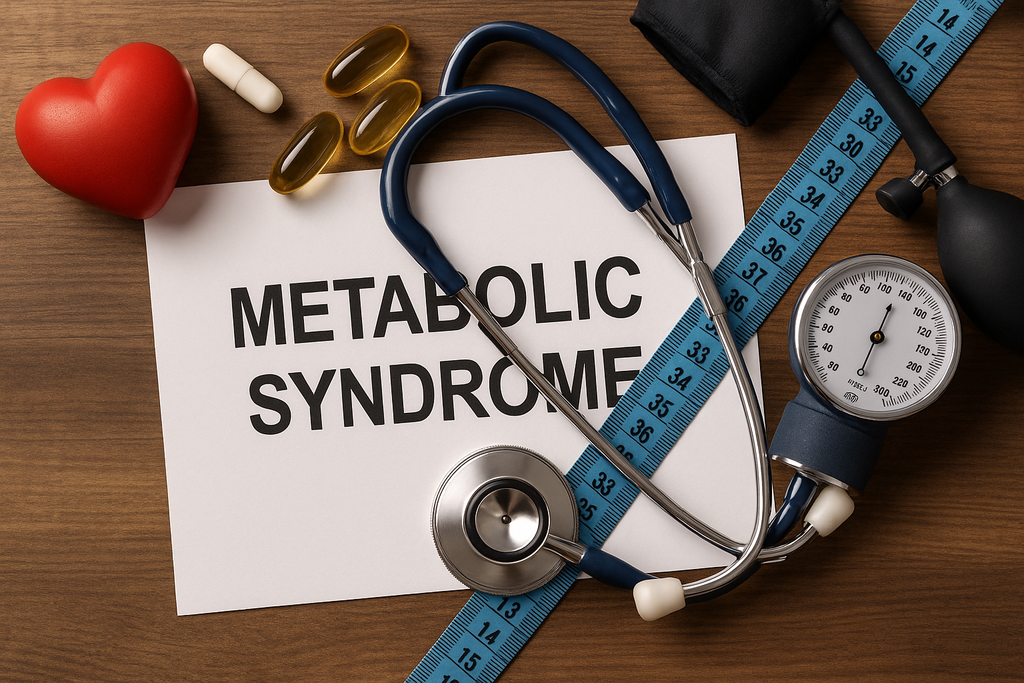News — metabolic health
Metabolic Syndrome Criteria: The 5 Risk Factors You Need to Know
abdominal obesity blood sugar cardiovascular health diabetes prevention elevated glucose HDL cholesterol heart disease high blood pressure high triglycerides insulin resistance low HDL metabolic health metabolic syndrome metabolic syndrome diagnosis prediabetes risk factors supplements for metabolic syndrome triglyceride levels weight loss
Modern lifestyles have given rise to a cluster of health conditions that are increasingly threatening global health. One of the most insidious among them is metabolic syndrome — a silent but dangerous constellation of risk factors that significantly ups your odds for heart disease, type 2 diabetes, and stroke. It isn’t a disease in itself, but rather a group of conditions that, when occurring together, set the stage for long-term chronic illness.
Understanding the criteria that define metabolic syndrome is the first step in addressing it effectively. If you’ve ever wondered what the specific risk factors are and how they impact your well-being, this guide will break it all down for you. We're going to examine the five hallmark risk factors that clinicians use to diagnose metabolic syndrome and why each of them matters more than you might think.
From Fatigue to Freedom: Reverse Insulin Resistance Naturally
berberine blood sugar balance blood sugar support fasting insulin fatigue and blood sugar glucose metabolism hormone imbalance insulin resistance insulin resistance diet insulin resistance symptoms insulin sensitivity insulin supplements liver health magnesium for insulin metabolic health natural insulin support prediabetes reversal reversing insulin resistance sugar cravings weight loss and insulin
Do you constantly feel tired after meals, struggle to lose weight, or wake up groggy no matter how long you sleep? These could be signs of insulin resistance—a silent metabolic disruptor that affects millions and often goes undiagnosed until it evolves into type 2 diabetes. The good news? Insulin resistance can be reversed with the right strategies, knowledge, and consistency.
This isn’t about quick fixes or extreme diets. This is your step-by-step guide to reclaiming energy, balancing blood sugar, and building a sustainable lifestyle that supports your body’s ability to heal. Whether you’ve just been diagnosed or suspect you’re on the path, this plan will help you move from fatigue to metabolic freedom.
The Connection Between Muscle Mass and Metabolism: Boost Your BMR
BMR build muscle calorie burn creatine fat burning fat loss HIIT vs steady state lean muscle long term fat loss metabolic boost metabolic function metabolic health metabolic supplements metabolism muscle mass protein intake resistance training resting energy expenditure strength training
Ever wonder why some people can eat more without gaining weight, while others struggle despite a clean diet? One major factor lies beneath the surface—muscle mass. Your muscles aren’t just for strength and aesthetics—they are metabolically active tissues that significantly influence your basal metabolic rate (BMR), or the number of calories your body burns at rest.
In this guide, we break down the science behind muscle and metabolism, showing you how building lean mass can rev up your internal engine. Whether you want to lose fat, maintain your weight, or enhance energy levels, understanding this muscle-metabolism link is a game changer for your health strategy.
Common Myths About Metabolism and Weight Loss Debunked
boost metabolism naturally calorie burn cardio vs weights eating frequency myths fat burners truth fat burning myths metabolic health metabolic rate explained metabolism and age metabolism boosters metabolism myths metabolism science metabolism supplements metabolism tips muscle and metabolism night eating myths nutrition and metabolism slow metabolism facts weight loss education weight loss truth
Metabolism is one of the most talked-about topics in health and fitness—and one of the most misunderstood. From “fast” and “slow” metabolism claims to trendy metabolic boosters, misinformation abounds. These myths not only create confusion but can also derail your weight loss efforts and lead to frustration when results don’t match expectations.
To cut through the noise, we’re breaking down the most common myths about metabolism and weight loss. Whether you’re trying to lose fat, build muscle, or just better understand your body’s natural processes, this comprehensive guide will help you separate fact from fiction so you can make smarter, more effective choices for your health journey.
Improving Insulin Sensitivity: The Role of Intermittent Fasting
balanced fasting diet blood sugar regulation fasting benefits fasting effects fasting for beginners fasting health tips fasting schedules glucose metabolism healthy lifestyle hormonal health improve insulin sensitivity insulin resistance insulin sensitivity insulin support intermittent fasting metabolic health
In today’s fast-paced world, managing blood sugar levels and preventing insulin resistance have become essential for overall health. Insulin sensitivity refers to how effectively your body responds to insulin, a hormone that helps regulate blood glucose. When insulin sensitivity is impaired, it can lead to conditions like type 2 diabetes, obesity, and other metabolic disorders.
Intermittent fasting (IF) has emerged as a powerful lifestyle intervention to enhance insulin sensitivity naturally. By creating structured periods of eating and fasting, this approach helps reset the body’s metabolic processes, offering numerous health benefits. This article dives into the science of insulin sensitivity and explains how intermittent fasting can be a game-changer for metabolic health.





